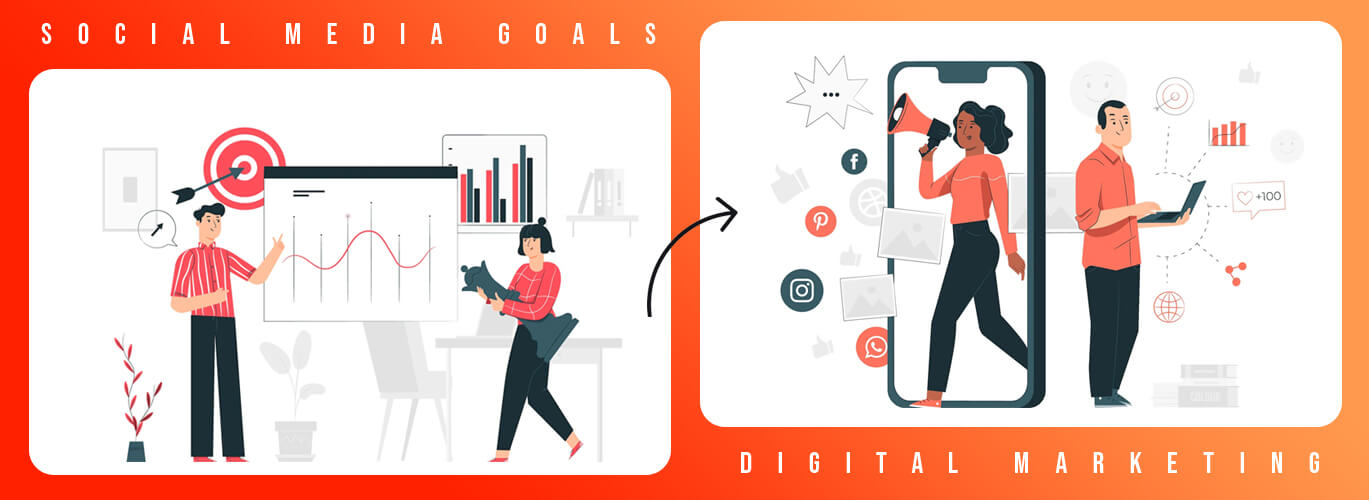You may be wondering how social media marketing really works for your business?
People are on social media every single day and will not go away anytime soon. If you don’t adapt to the new normal of marketing you may find your business on the decline or even worse out of business. You can leverage social media marketing to prevent this and rage new growth in your business
What is social media marketing?
Social media marketing is simply the process of promoting your business to potential customers through social media platforms. However to be truly successful you have to promote the interests of your customers more than your business itself.
There are many variations of social media marketing. It’s significant that you find the difference between each of them. The original component of social media marketing is known as social media management.
Social media management is the process of creating and publishing content through social media channels like Facebook, Instagram, twitter, Youtube, Linkedin and Pinterest. It involves setting your social media accounts and posting appropriate content to your pages. The goal of this function is to reach your target audience and build trust by posting engaging contents.
Some of the Social Media Marketing Platforms

01Facebook
- Best used for: Brand awareness; advertising
- Users: 1.9 billion daily active users worldwide
- Industry impact: B2C
This is the most established and largest social media platform. It has become an invaluable tool for B2C businesses since its launch in 2004, providing advanced advertising tools as well as organic opportunities.

02TikTok
- Best used for: creative video content, user-generated content, brand awareness, Short-form video.
- Users: 1 billion active monthly global users
- Industry impact: B2B and B2C
You probably think of TikTok, when you think of short-form video. In 2020, the platform increased in popularity and showed no signs of slowing down. It is one among the best platforms for community building.

03Instagram
- Best for: High-quality images and videos, user-generated content, advertising
- Users: 1 billion monthly active users
- Industry impact: B2C
Instagram has taken the world by storm. Instagram is where brands go when it comes to sharing visually compelling content. The other thing that sets the platform apart is its advanced ecommerce tools.
Users can discover brands today, browse their products and/or service, and complete a purchase without ever leaving the app, making Instagram a hard platform to beat.

04Twitter
- Best for: Public relations; customer service; community building
- Users: 211 million daily active users worldwide
- Industry impact: B2B and B2C
Twitter aims on words while Instagram focuses on visuals. As the early days of 140-character Tweets, the platform has now extended to include an audio tool called Twitter Spaces, a community-building tool called Twitter Communities, and Twitter Moments to share amazing content with your followers.

05LinkedIn
- Users: 774 million active users worldwide
- Best for: B2B relationships, business development, and social selling
- Industry impact: B2B
LinkedIn is perhaps the only platform where its audience is clearly defined: Working professionals looking to network and explore new opportunities.
This makes it the ideal platform for B2B companies to identify key decision-makers and develop an industry-specific community.

06YouTube
- Best for: long-form entertainment, brand awareness and how-to videos
- Users: Over 315 million daily active users worldwide
- Industry impact: B2C and B2B
YouTube is one of the most visited websites in the world. Marketers name Youtube as the best platform to build community.
Along with being an incredibly popular platform, its users also tend to stay longer on it as it features mostly long-form content, making it a perfect platform to share educational content.
Some of the Social media marketing strategy
Leveraging the power of social networks about creation, creating content, creating value and creating conversation to the world. This takes planning and some work. Social media strategy consists of clearly defining goals, building a content plan, estimating impact, creating a consistent production schedule and measuring the performance data to make sure you are taking constant and calculated action that will yield the results we want to see for our business.
The complete point of a social media strategy is ultimately to save time while we free up focus for all the other things that you need to do to run your business.
Identify your goals
Before spending a single minute doing something or a penny on ads, you must be clear about what you want to achieve through your business activities on social media. The most common social media goals for entrepreneurs include increasing brand awareness, establishing social proof to help build following, acquiring leads and new customers, creating excitement for brand and products, and offering customer service.
If you have just launched one of your primary goals might be to create excitement and the man for your products by sharing beautiful product shots and some short video Lifestyle clips, featuring people using your products. You can even collaborate with influencers to test and review your products. If you are just launching the other one of your Gold might be to begin building brand awareness for customers to know about your company and the fact that you exist.
Think hard about the stage of business it is currently at. Then just select one or two goals to focus your efforts on.
Specify your target group.
Knowing your audience is important to a successful social media marketing plan. Essentially, you must be developing content that your target group comments on, likes and shares. There are many few ways to get to know your audience.
- First, find who your content agrees the most with and see whether this group matches the ideal audience for your brand, with qualified leads you will transform your audience to customers in no time.
- Become familiar with appropriate surveys, reports, and statistics to earn more insights.
- Approach with some personas to demonstrate the ideal audience. This will generally be a detailed description of certain people, with real needs and wants, who you want to turn into your fans and followers. Understanding your average follower’s persona will enable you to adjust your social media campaigns as per your real audience’s expectations.
Pick the right communication channels.
Social media is not just Facebook. While selecting the appropriate platforms for your business, you should look at the advantages of each and every one of them. Generally, the focus is to select the social networks that are used by your target audience the most and suit your brand’s image at the same time. Once you find the platforms you’re going to include in your social media strategy, plan a social media marketing plan for every social network.
Set up social media marketing KPIs for your brand
Your social media marketing KPIs (key performance indicators), will assist you to track the success of your social media strategy and measure your return on investment (ROI).
Some common KPIs include:
- Engagement rate and/or reach in your target group
- Website traffic from social media sources
- Conversion rates from social media visitors
- Leads generated from social media activity
- Revenue generated from social media marketing
Select the KPIs that are most significant to your brand and regularly track them. This will help you know whether or not your social media strategy is successful.
You will not know what you’re working toward or if your efforts are actually making a difference without KPIs. So, you must surely find a place for them in your social media strategy.
Benefits of Social media marketing
Social media provides huge benefits that traditional media formats like television, radio and outdoor simply can’t offer. If your organisation is able to fully leverage it, it will deliver increased brand awareness, convert leads into paying customers and qualified web traffic and conversions.
Engage your audience
Traditional media like television, print, video and outdoor are “broadcast” formats meaning there is a handful of media publishers sharing a message that the audience can’t respond to. These formats have a v to make their media more interactive, however it’s pale in comparison to social media. With modern smartphones, everyone is some media publisher. Millions of people can take a photo and publish it on social media in seconds and there will be billions of people who can respond to it. This unique attribute of social media human eyes is a brand by giving it the unique voice. It helps create meaningful connections with their audience, ultimately increasing trust.
Data measurement and Optimization
You can measure literally everything on social media. How many people watch reviews, how many, how many people comment, share the video clicked on the link and so on. Utilising a tracking pixel the social media channels can also record the actions that people take as they travel around the internet.
Grow organically
You definitely do not need to have a big paid ad budget to be successful on social media. In fact there are many social media marketers who are generating loads of traffic and making tons of money e without spending a cent on paid Ads. Your organic or free reaches the proportion of people who see your social media posts for free. It varies between social media channels.
The initial people who see your social media posts engage with that, by liking, commenting or sharing it the algorithms will reward that content with more reach which means it will be shown to a greater proportion of your followers and potentially become trending and will go viral.
And there you have it — your social media marketing strategy!






